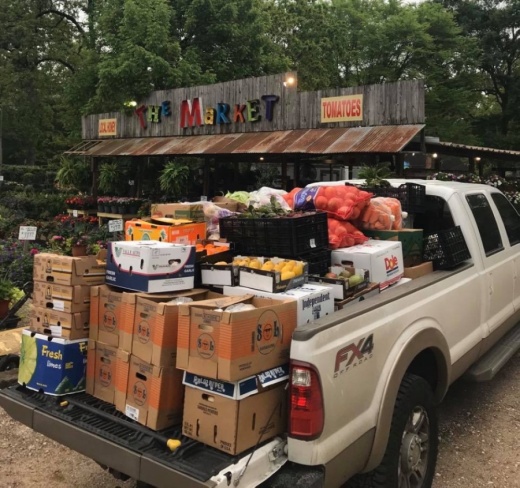Local Spring and Klein farms have seen a decrease in demand for produce from restaurants as a result of dine-in services being shut down last week. Despite the decreases, though, local farmers said they are seeing support from the local community.
Gov. Greg Abbott took legislative action in an effort to curb the spread of the ongoing coronavirus pandemic by signing a March 19 executive order forcing eateries to close dine-in services, bars and other businesses.
Theiss Farms co-owner Stacey Theiss Watthuber said the unexpected closures have affected the demand on produce that was grown in the growing season. She said she will try to sell thehe leftover produce grown by her brother, Dwayne Theiss, in the farm’s market instead.
“When the restaurants were shut down, nobody wanted collard greens anymore or mustard greens and stuff like that, so ... [my brother] may lose what greens he currently had in the field,” Watthuber said. “We are selling some here in our market, but he had a thousand crates of collard greens in the field. We obviously can't sell that much here.”
According to Theiss, the farm has seen an 80% decrease in demand from restaurants since the governor's orer was issued. Despite this, Theiss said he still plans to open the Stuebner Airline market location by late April or early May.
"I'm going to keep planting and keep preparing to open my market by May 1, and hopefully, it's straightened out by then," Theiss said.
Atkinson Farms owner Mike Atkinson said his farm also took a hit from the closures, seeing an estimated 75% decline in demand from restaurants.
“We're hoping and praying that within a couple weeks, this virus goes away, and everything's back to normal,” he said. “The restaurants ... will go back to normal real quick, [and] people will go back ... [to] restaurants as soon as this crisis is over with.”
Despite seeing a decrease in demand from restaurant clientele, Watthuber said Theiss Farms is still keeping busy with produce markets. When grocery stores saw a shortage in produce last week, Watthuber said Theiss Farms met those demands.
“We're seeing a little bit of tapering off as compared to last week, but [we] were still pretty busy, and a lot of people still want to come to our environment more than [they want to] go to a grocery store,” Watthuber said.
Watthuber said she believes people feel safer shopping at Theiss Farms market because of the open-air environment.
In addition to offering pickup orders and limiting the number of people in the market at one time at the Rayford Road market location, Watthuber said she has placed markers on the ground 6 feet apart to help people practice social distancing.
Watthuber said customers are now buying more produce than usual.
“It's kind of crazy because some of the things that we don't sell a lot of—all of a sudden, we're selling a lot,” Watthuber said. “Pretty much, if they see it, [customers] are buying it. Fruits, avocados, broccoli and fresh stuff like that—it's pretty much across the board.”
Atkinson said customers at his farm's markets seem to also be spending more dollars than usual on single purchases.
“An average customer [used to] come into my little market and spend $12, $15, $18, and now, they come in and they spend $25,” he said. “When we didn't have the coronavirus [outbreak] going on, ... they'd come in every day or every other day. Now, they're afraid that it's going to run out, so they buy more.”
However, local farms are still facing challenges amid the coronavirus pandemic. Watthuber said it is difficult for Theiss Farms to keep up with changing produce prices from suppliers at this time.
“Some of the stuff that we were getting, we're either going to have to discontinue because we don't want to have an extreme price,” she said, "or we're just not going to make anything on it and just sell it for cost."
Watthuber said the best way for the community to support is by continuing to shop with local farms and markets.
“Just keep coming because when people stop coming, then, we're going to be stuck with a lot of stuff here ourselves,” Watthuber said. “I totally understand that people don't want to get out, and we'll do the best that we can to get the produce to them if they can't.”





